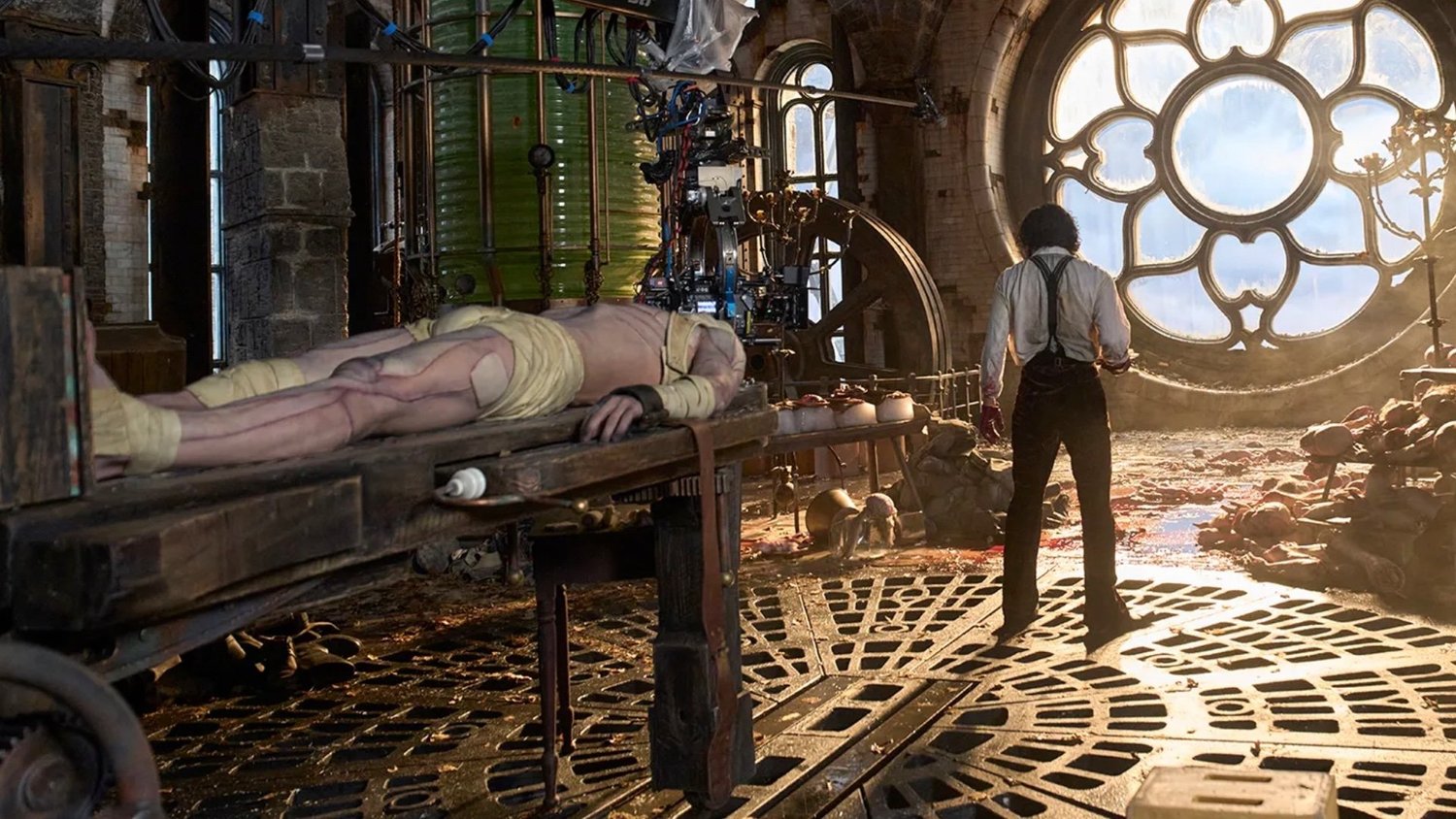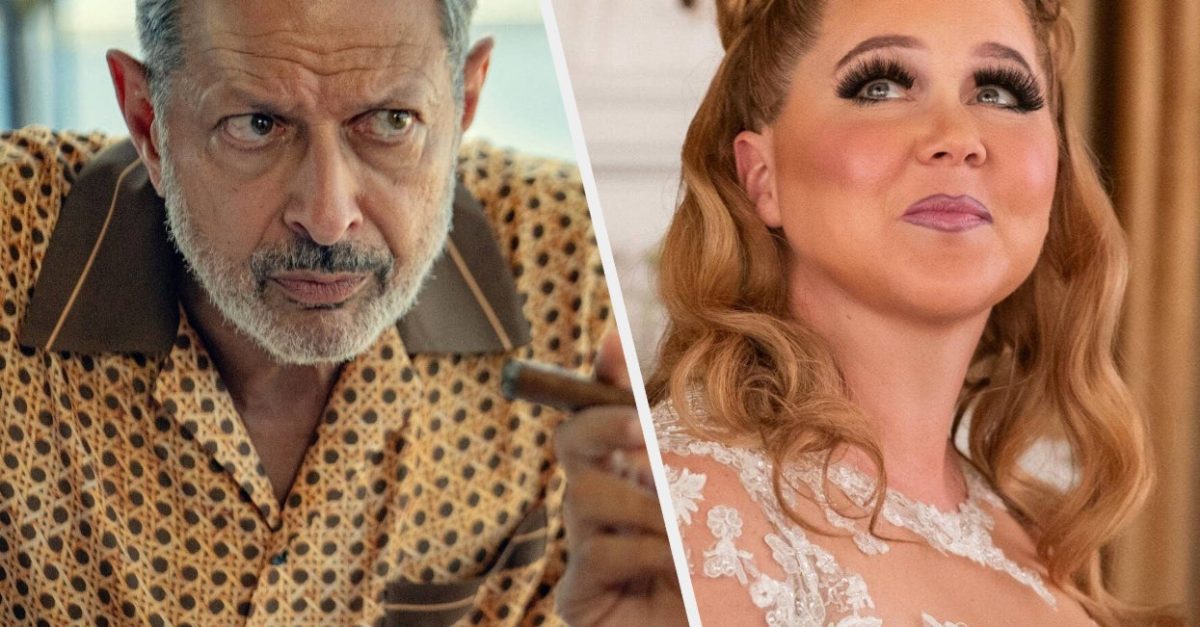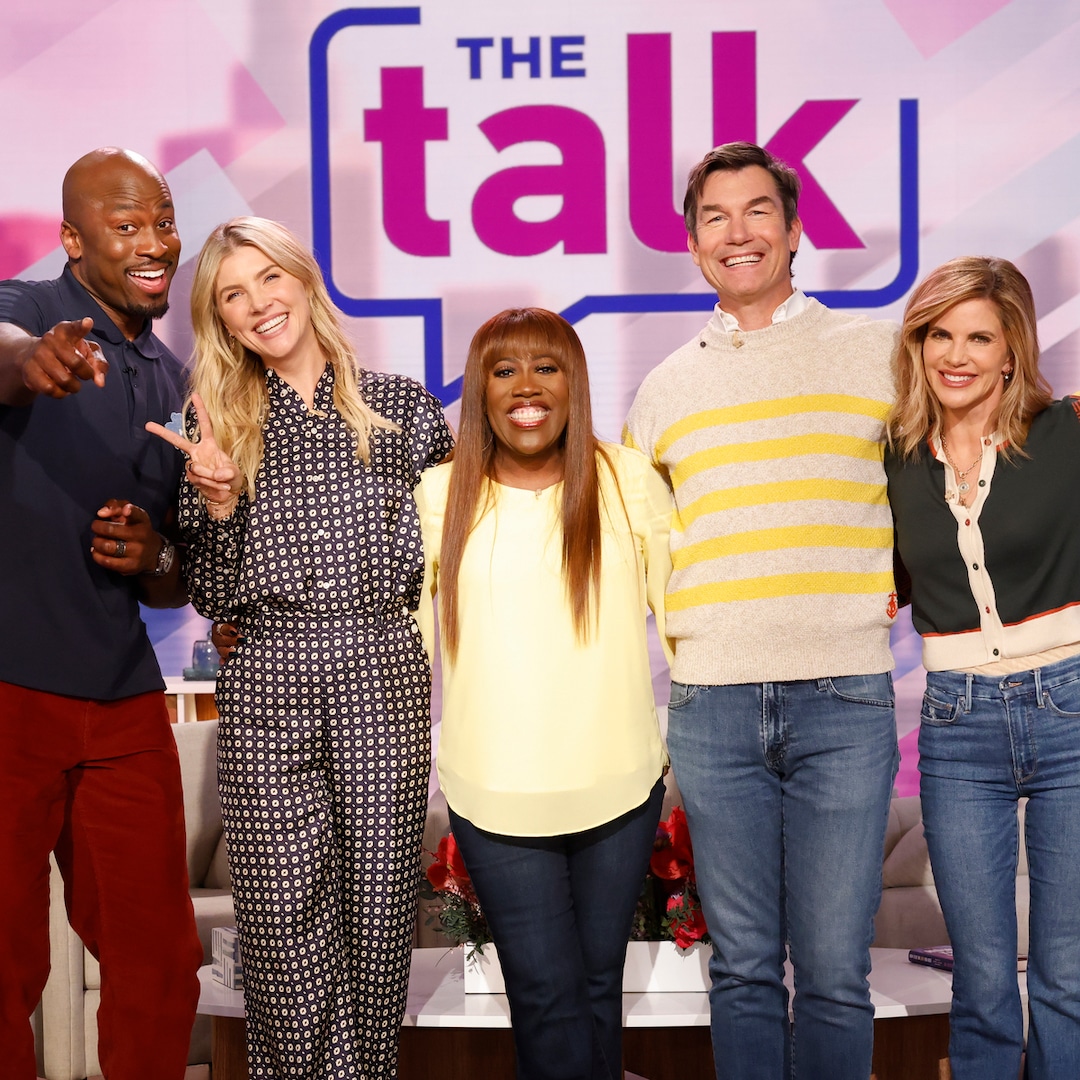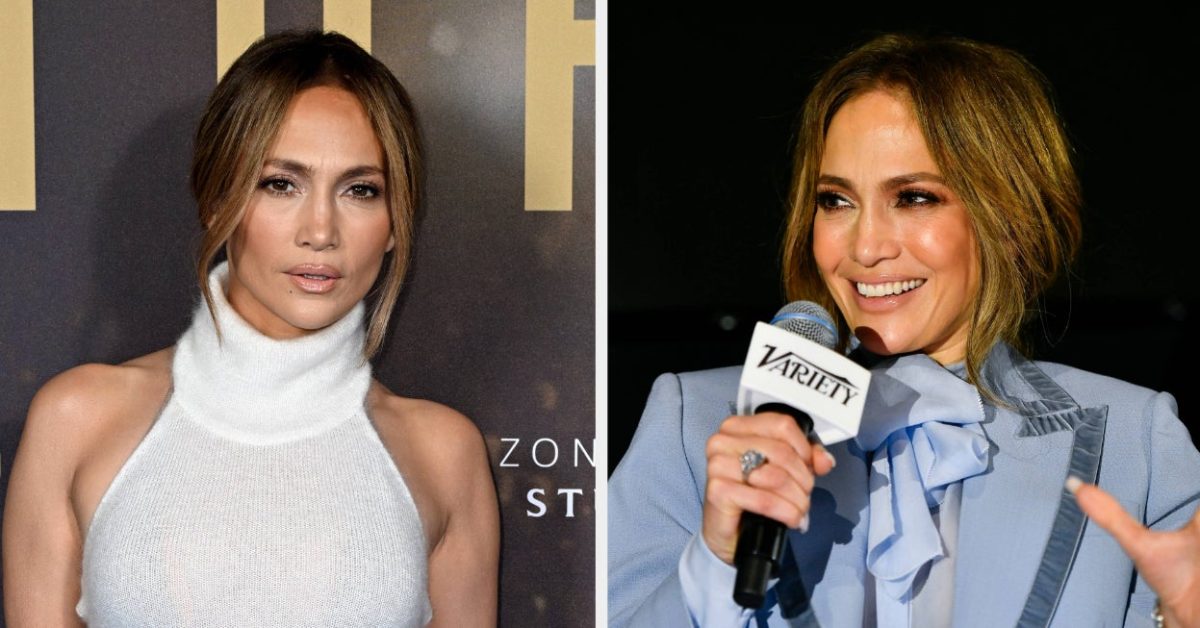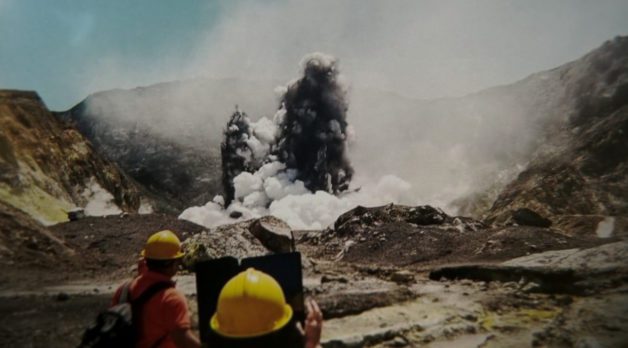
“Each Second Meant the Difference Between Life or Death”: Rory Kennedy on The Volcano: Rescue from Whakaari
Dec 21, 2022
The Volano: Rescue from Whakaari (Courtesy of Netflix)
Forget social and political issues—in documentaries, 2022 is shaping up to be the year of the volcano. There was Sara Dosa’s exquisite Fire of Love (which I fell in love with back at CPH:DOX in March, also screening at DOC NYC), in which a pair of lovestruck vulcanologists are quite literally consumed by their passion. Now we have not one, but two volcano-centric films debuting at this year’s DOC NYC. While I’ve not seen Herzog’s (pre-festival premiering) The Fire Within: A Requiem for Katia and Maurice Krafft, its title naming Dosa’s aforementioned protagonists, I’m guessing it’s likely the polar opposite of Rory Kennedy’s latest, The Volcano: Rescue from Whakaari. Though the volcano triumphs in the end of both films, Kennedy eschews the scientific angle (no volcanologists were harmed in the making of the film—because they aren’t even in the film) in favor of the film’s humanitarian core.
Comprised of footage from survivors (and Nat Geo cameras) alongside interviews with those who were there (with the emotional and/or physical scars to prove it), The Volcano: Rescue from Whakaari is a nail-biting, blow-by-blow, firsthand account of the titular 2019 eruption off the coast of New Zealand. While “White Island” was known to spew its toxic contents every few years or so in the middle of the night, this time the blast occurred during business hours, so to speak, while the area was filled with sightseeing tourists innocently snapping pics of the stunning crater and its surroundings.
Fortunately for Filmmaker, the force behind the film—and other docs delving into public tragedies (2022’s Downfall: The Case Against Boeing, 2014’s Last Days in Vietnam, 2007’s Ghosts of Abu Ghraib)—was gracious enough to take time from her busy schedule to answer a few questions about The Volcano: Rescue from Whakaari, including how a documentarian with the Kennedy name connects to characters grappling with a personal nightmare in the glare of the media spotlight. The Volcano: Rescue from Whakaari debuts at DOC NYC on November 11 with a Netflix release to follow on December 16.
Filmmaker: The credits cite Alex Perry’s Every Second Counts: The True Story of the White Island Eruption as source material. What made you want to turn this story into a film?
Kennedy: For one thing, it was an absolutely terrific article—deeply researched, dramatically structured, beautifully written, just a powerhouse of a piece. But initially, I suppose there were two main aspects of the story that resonated deeply. For one, I had heard very little of the incident. That article of Alex Perry’s was my very first real understanding that this eruption had happened, that so many lives had been lost and so many lives transformed. I had not heard many details about it—it made me feel that perhaps others had missed it, too. This was, after all, December 2019, in the throes of nonstop Trump headlines and on the brink of COVID’s arrival. I felt strongly that this was a story that needed to be known more widely—for the families, for the survivors, for the rescuers, for the viewers.
Second, in 2018 when the Woolsey Fire ripped into Los Angeles, my family went through an emergency evacuation and our home almost burned down. Many of our friends and neighbors were not as lucky. We returned the next day to help put out spot fires, bring in supplies and, along with many others, do whatever we could for our community.
As it turned out, for a number of reasons the firefighting support had been compromised and, as we would later learn, our house was saved by two neighbors armed with a bucket and a shovel. For this I felt a massive sense of gratitude, but also I had something of an awakening. One the one hand, here was Mother Nature—absolutely brutal and indifferent, made fiercer by climate change. In the face of this, we humans were severely limited in our ability to control events. On the other hand, there was also our community, our town coming together in a very real and impactful way to fight for each other, support each other, protect each other. There was something, to me, very meaningful and affirming in that. Reading Alex Perry’s article, I could see that behind the horrible events of that day on Whakaari, at its core this was that story, and I wanted to tell it.
Filmmaker: The tick-tock nature of the film reminded me a bit of Last Days in Vietnam (though also of Elizabeth Chai Vasarhelyi and Jimmy Chin’s Nat Geo doc The Rescue). Why did you choose the “minute-by-minute account” structure?
Kennedy: For me, different subjects appeal for different reasons—be it an issue that strikes a chord, characters that move me, events that resonate. Not that it is necessarily ever just one thing. From the beginning, The Volcano struck me largely as an event—a harrowing, lethal event, an eruption that happened at a specific time on a specific day and set into motion a specific narrative. So, from the start, my impulse was to try to render that event with the belief that the characters involved would emerge and define themselves through their relationship to it, through their choices and actions in the face of that eruption. Similarly, my hope was that whatever meaning one might extract from that day, it too would come out of absorbing what had happened and spending time with the people involved.
Given the proliferation of cellphones and video cameras, as well as the fact that this was indeed a tourist activity, I believed there had to be footage that would enable me to stay close to the ground, minute-by-minute, and that by structuring the film that way, the sum total of those minutes would add up to something larger.
Filmmaker: How did you find all the interviewees, and how did you choose who to include?
Kennedy: We made a conscious decision with this production to make sure we allocated enough time to reach out to everyone we could locate who was on the island or part of the rescue teams that day. We were fortunate that Netflix recognized that, for a project like this to be done properly, we would need to dedicate over a year to research and production. We entered this project with our eyes and hearts open; we had no agenda other than to let the people who experienced this unprecedented event tell their stories in their own voice.
Ultimately, we engaged in countless off-the-record conversations, building trust and developing lasting relationships across hundreds of emails, calls, Zooms and transcontinental visits. Each conversation we had, on or off camera, helped us gain a more complete understanding and depict more accurately what had transpired December 9, 2019 on Whakaari/White Island.
Because this was a tragic and surprising event, we also went through a lot of training about how to responsibly and respectfully engage with individuals who have been through traumatic experiences and may have PTSD. We felt it was important to respect where each person was in their own recovery and healing process. While not everyone was ready yet to relive these details or speak on camera about that day, we were fortunate that so many people in the center of this rescue trusted us with their incredible stories. Some people, such as Jesse Langford (an amazing young man with the most tenacity and determination that I have ever witnessed) and Brian Depauw (whose split-second decision remarkably spared him and several tourists major injuries) shared their stories publicly for the first time in our film. It was very humbling to be a part of this process, and we were overwhelmed and moved by each and every person’s bravery and courage, both on the day of the eruption and two years later. Their willingness to be so raw, open and honest with us elevated this film to a whole new level.
Filmmaker: What was the editing process like? Was there any graphic, or perhaps more sensationalistic, footage you purposely avoided including?
Kennedy: Working with our experienced editor Jawad Metni over the course of a nine-month edit, we were able to weave together several different storylines and perspectives into one chronological narrative.
Our first act devoted time to place and character before the eruption began, so that our audiences could appreciate the impressive natural beauty of this part of the world, better understand what brought each person to the island that day and get a sense of who these people were before their lives were forever changed. For this section of the film, we had a plethora of stunning home movies, found footage and professionally shot material to help establish a rich visual language.
Once we reached the second act and the volcano began to suddenly erupt, the film took a different turn tonally. From the moment Matt Urey first noticed the ash cloud rising from the sulfur lake, each second meant the difference between life or death. Consequently, time slowed down for our subjects, and the film became more impressionistic. We explored moving from macroscopic to microscopic slow-motion imagery. We also worked with designer Matt Brunson-Cline and the team at Design Syndicate to create a stop-motion design that gave more space for the actual audio from the moment of eruption, and the visceral descriptions from the survivors themselves, to drive the narrative.
We avoided any kind of realistic re-creation so that audiences could easily distinguish between the actual footage filmed that day and the impressionistic footage that was created based on the memories of our interviewees. We also received from one survivor 16 minutes of powerful and heartbreaking, never-before-shared cellphone video and audio, recorded from the moment of eruption through to the moment of rescue. We were careful to use this sparingly and respectfully—only when descriptions of the event were not able to capture the sheer horror that those on the island experienced that afternoon.
In the final act, we made a conscious decision to allow each person to share their different takeaways, emotions, realizations. We worked hard to honor each person’s story of trauma, loss, resilience, bravery and recovery. Throughout the edit process, we felt our job as filmmakers was to get out of the way and give each survivor the space to recount the events in the way they experienced them. Through their frank and unfiltered memories, it is our hope that eventually the world can begin to make sense of this shocking and humbling tragedy and learn what it can teach us about Mother Nature, human nature and our instinct to care for one another even in the most dire of circumstances.
Filmmaker: How does your own experience of dealing with the media spotlight during private tragedy affect interactions with your characters, many of whom are similarly forced to grieve in public?
Kennedy: It is hard for me to know how I appear to our contributors. While I don’t bring my own past into the conversation, I do think the fact that subjects may know I have experienced tragedy in the public arena could create a connection or the hope of a shared understanding—that my own experiences might help others feel safe sharing theirs.
But I am very careful never to push too hard or force anyone to participate. They have to ultimately want to share their story. After The Volcano was finished, we made a private preview of the film available to the people who participated—all of whom were courageous, really extraordinary individuals. We left it up to them if they wanted to view the film or not. Despite the trauma and the loss, most watched it and, I am very happy to say, all who did felt it to be both respectful and accurate. To me, this is absolutely the most important and gratifying aspect of the film’s release—to know that these people, heroes all, who shared their story with the public—that they feel good about having done so.
Publisher: Source link
TV Shows That Got Canceled In 2024
TV Shows That Got Canceled In 2024 Which 2024 canceled TV show will you miss the most? Share your pick in the comments! Disclaimer: This story is auto-aggregated by a computer program and has not been created or edited by…
Dec 22, 2024
How The Talk Emotionally Ended After 15 Years
The Talk has officially said "Goodbye." After 15 seasons and 2,993 episodes, the CBS daytime show came to an end on Dec. 20 with a heartfelt farewell from hosts Akbar Gbajabiamila, Amanda Kloots, Natalie Morales, Jerry O'Connell and Sheryl Underwood. The episode began with a standing ovation for the…
Dec 22, 2024
Jennifer Lopez Asked About Turning 60, Age
Jennifer Lopez Asked About Turning 60, Age Never ask a woman her age, a man his salary, or Jennifer Lopez how she feels about turning 60. On Sunday, the actor was interviewed by Variety amid the release of her new…
Dec 21, 2024
Lala Kent Shares Text With Ally Lewber After James Kennedy’s Arrest
The BCU (Bravo Cinematic Universe) was shaken on March 3, 2023, when it was confirmed that Tom and Ariana had ended their nine-year relationship amid the revelation that he'd had a seven-month affair with Raquel. "I made mistakes, I was…
Dec 21, 2024


